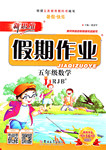题目内容
Maybe if I _______ literature, but not science then, I would be able to give you more advice now.
|
A.studied |
B.would study |
|
C.had studied |
D.was studying |
C
【解析】本题考查虚拟语气。句意为“或许当初我要是学了理科而不是文科,现在就能给你更多的帮助。”then表示过去的时间,if引导的从句是对过去的虚拟,因此使用过去完成时。选C。

 新思维假期作业寒假吉林大学出版社系列答案
新思维假期作业寒假吉林大学出版社系列答案Maybe If I get my grades_______at school, I can enter the key university.
A. up B. out C. on D. over
Maybe if I________ science, and not literature then, I would be able to give you more help.
| A.studied | B.would study | C.had studied | D.was studying |
You’ve just come home, after living abroad for a few years. Since you’ve been away, has this country changed for the better—or for the worse?
If you’ve just arrived back in the UK after a fortnight’s holiday, small changes have probably surprised you—anything from a local greengrocer suddenly being replaced by a mobile-phone shop to someone in your street moving house.
So how have things changed to people coming back to Britain after seven, ten or even 15 years living abroad? What changes in society can they see that the rest of us have hardly noticed—or now take for granted? To find out, we asked some people who recently returned.
Debi: When we left, Cheltenham, my home town, was a town of white, middle-class families—all very conservative (保守的). The town is now home to many eastern Europeans and lots of Australians, who come here mainly to work in hotels and tourism. There are even several shops only for foreigners.
Having been an immigrant (移民) myself, I admire people who go overseas to find a job. Maybe if I lived in an inner city where unemployment was high, I’d think differently, but I believe foreign settlers have improved this country because they’re more open-minded and often work harder than the natives.
Christine: As we flew home over Britain, both of us remarked how green everything looked. But the differences between the place we’d left behind and the one we returned to were brought sharply into focus as soon as we landed.
To see policemen with guns in the airport for the first time was frightening—in Cyprus, they’re very relaxed—and I got pulled over by customs officers just for taking a woolen sweater with some metal-made buttons out of my case in the arrivals hall. Everyone seemed to be on guard. Even the airport car-hire firm wanted a credit card rather than cash because they said their vehicles had been used by bank robbers.
But anyway, this is still a green, beautiful country. I just wish more people would appreciate what they’ve got.
1.After a short overseas holiday, people tend to _______.
|
A.expect small changes |
|
B.notice small changes |
|
C.welcome small changes |
|
D.exaggerate small changes |
2.How does Debi look at the foreign settlers?
|
A.Cautiously. |
B.Sceptically. |
|
C.Positively. |
D.Critically. |
3.When arriving at the airport in Britain, Christine was shocked by _______.
|
A.the relaxed policemen |
B.the messy arrivals hall |
|
C.the bank robbers |
D.the tight security |
4.Which might be the best title for the passage?
|
A.Back in Britain. |
B.Life in Britain. |
|
C.Britain in Future. |
D.Britain in Memory. |